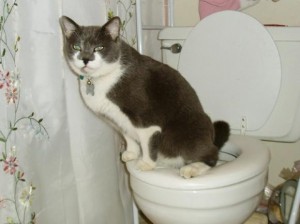Reasons Flushing Cat Poop Down Your Toilet Isn't a Good Idea - Advice for Proper Handling
Reasons Flushing Cat Poop Down Your Toilet Isn't a Good Idea - Advice for Proper Handling
Blog Article
The article author is making a number of great observations on the subject of Can You Flush Cat Poo or Litter Down the Toilet? in general in this content just below.

Intro
As pet cat owners, it's important to bear in mind exactly how we take care of our feline buddies' waste. While it may appear hassle-free to purge pet cat poop down the toilet, this practice can have harmful repercussions for both the atmosphere and human health.
Ecological Impact
Purging pet cat poop presents unsafe virus and parasites into the water system, posing a significant threat to aquatic ecosystems. These impurities can adversely affect marine life and concession water quality.
Health Risks
Along with ecological concerns, flushing pet cat waste can additionally position wellness risks to humans. Feline feces may consist of Toxoplasma gondii, a parasite that can cause toxoplasmosis-- a potentially severe disease, especially for pregnant ladies and people with damaged body immune systems.
Alternatives to Flushing
Thankfully, there are safer and more responsible means to dispose of cat poop. Consider the complying with alternatives:
1. Scoop and Dispose in Trash
The most common approach of getting rid of feline poop is to scoop it into a naturally degradable bag and throw it in the trash. Make certain to use a committed clutter scoop and throw away the waste quickly.
2. Usage Biodegradable Litter
Select biodegradable cat litter made from products such as corn or wheat. These clutters are eco-friendly and can be securely taken care of in the garbage.
3. Bury in the Yard
If you have a yard, think about burying pet cat waste in an assigned area far from vegetable gardens and water resources. Make sure to dig deep enough to stop contamination of groundwater.
4. Install a Pet Waste Disposal System
Buy a pet dog waste disposal system especially created for pet cat waste. These systems utilize enzymes to break down the waste, decreasing smell and environmental influence.
Final thought
Responsible family pet ownership prolongs past providing food and shelter-- it additionally involves proper waste administration. By avoiding purging cat poop down the toilet and selecting different disposal approaches, we can minimize our environmental footprint and safeguard human health and wellness.
Why You Should Never Flush Cat Poop Down the Toilet
A rose by any other name might smell as sweet, but not all poop is created equal. Toilets, and our sewage systems, are designed for human excrement, not animal waste. It might seem like it couldn’t hurt to toss cat feces into the loo, but it’s not a good idea to flush cat poop in the toilet.
First and foremost, assuming your cat uses a litter box, any waste is going to have litter on it. And even the smallest amount of litter can wreak havoc on plumbing.
Over time, small amounts build up, filling up your septic system. Most litter sold today is clumping; it is made from a type of clay that hardens when it gets wet. Ever tried to scrape old clumps from the bottom of a litter box? You know just how cement-hard it can get!
Now imagine just a small clump of that stuck in your pipes. A simple de-clogger like Drano isn’t going to cut it. And that means it’s going to cost you big time to fix it.
Parasitic Contamination
Believe it or not, your healthy kitty may be harboring a nasty parasite. Only cats excrete Toxoplasma in their feces. Yet it rarely causes serious health issues in the cats that are infected. Most people will be fine too if infected. Only pregnant women and people with compromised immune systems are at risk. (If you’ve ever heard how women who are expecting are excused from litter cleaning duty, Toxoplasma is why.)
But other animals may have a problem if infected with the parasite. And human water treatment systems aren’t designed to handle it. As a result, the systems don’t remove the parasite before discharging wastewater into local waterways. Fish, shellfish, and other marine life — otters in particular — are susceptible to toxoplasma. If exposed, most will end up with brain damage and many will die.
Depending on the species of fish, they may end up on someone’s fish hook and, ultimately on someone’s dinner plate. If that someone has a chronic illness, they’re at risk.
Skip the Toilet Training
We know there are folks out there who like to toilet train their cats. And we give them props, it takes a lot of work. But thanks to the toxoplasma, it’s not a good idea.

I am just very involved in How to Dispose of Cat Poop and Litter Without Plastic Bags and I hope you enjoyed the entire post. So long as you enjoyed reading our page kindly don't forget to pass it around. Thanks a lot for going through it.
Get Quote Now Report this page